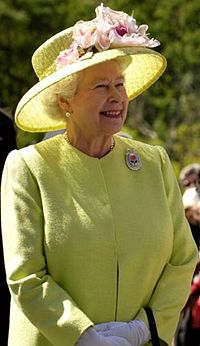Commonwealth of Nations
The Commonwealth of Nations is an international organisation that evolved out of the British Empire. It was informally established in 1926 as a result of the Imperial Conference, but was formally recognised under the terms of the Statute of Westminster, 1931. Between 1931 and 1949, the membership consisted of the United Kingdom and the Dominions. Republics were not allowed to join until 1949, when India was allowed to remain a member after becoming a republic in 1950. Ireland left the Commonwealth on becoming an independent republic in 1949.
Although formally the organisation is the Commonwealth of Nations, it is more often known simply as the Commonwealth. Like the United Nations, the Commonwealth is led by a Secretary-General, with the British monarch, Queen Elizabeth II, as the symbolic Head of the Commonwealth.
Membership
After 1950, the membership of the Commonwealth expanded to include republics, and several local monarchies as well as the Dominions. In theory, a colony or Dominion has to seek permission to remain a member after becoming a republic, but this is usually granted.
Membership of the Commonwealth is voluntary, and member states are free to withdraw for any reason at any time. Pakistan withdrew in January 1972 in protest at the recognition of the secession of East Pakistan and its independence under the name of Bangladesh. Pakistan attempted to rejoin later in the 1970's and 1980's, but its application was vetoed by the Government of India, because of the ongoing dispute over Jammu and Kashmir. It was eventually allowed to rejoin in October 1989. Zimbabwe withdrew from the British Commonwealth in December 2003 in protest at the international community's opposition to the ZANU-PF regime's controversial land seizure policy and the regime's human rights abuses.
When the membership of a country is suspended, that country is not allowed to send representatives to meetings such as the Commonwealth Heads of Government Meeting (CHOGM). South Africa was suspended from membership in 1961 because of international criticism of its apartheid policies. Fiji's membership was deemed to have lapsed as a result of Sitiveni Rabuka's coup d'etat and proclamation of Fiji as a republic in October 1987. Nigeria had its membership suspended between 1995 and 1999 as a protest against the execution of Ken Saro-Wiwa and eight other Ogoni activists by the military regime of General Sani Abacha. Fiji had its membership suspended in 2000 to 2001 and since 2006, due to coups there.
Since 1995, the decision to admit Cameroon and Mozambique has proved controversial, as only a small part of Cameroon was ever under British rule, and as Mozambique is a former Portuguese colony. In late 2006, Rwanda reportedly applied for membership, but this attracted criticism, as Rwanda is a former Belgian colony. There have been calls since 1991 for the unrecognised Republic of Somaliland to be granted both international recognition as an independent state and full membership of the Commonwealth.
Commonwealth Games
Since 1930, the athletes of the Commonwealth have come together in an Olympic Games-type atmosphere every four years, halfway between each Olympiad. The first Commonwealth Games (then called the Empire Games) was held in Hamilton, Ontario.
Commonwealth Day
At the 1975 CHOGM, Canada proposed an annual 'Commonwealth Day' to focus attention on the organisation and its global activities. The following year, the second Monday of March was agreed upon, and 1977 saw the first simultaneous observance day throughout the Commonwealth. The day was chosen as one when most children would likely be in school; this would be an opportunity for the younger generations to learn about their shared heritage.[1] The day has since been extended to an entire 'Commonwealth Week' around that time.[2] To mark the day, the Head of the Commonwealth issues a message; for example, in 2008 Queen Elizabeth II chose to focus on climate change, with a theme which emphasised environmental choices in all sections of society.[3]
Footnotes
- ↑ Commonwealth Secretariat: 'Commonwealth Day in the archives'.
- ↑ Commonwealth Secretariat: 'Commonwealth Week News'.
- ↑ Commonwealth Secretariat: 'A message from Her Majesty The Queen, Head of the Commonwealth'. 10th March 2008.
